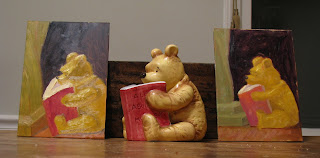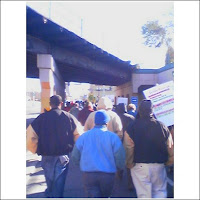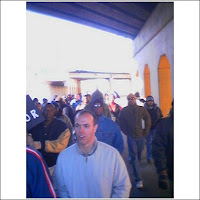Say it loud: I’m white and male and not very proud.
And it’s all thanks to two NPR stories. The first came as I was driving to work. WUNC, our local station hosts a program called The State of Things. Frank Stasio’s topic today was “Hillary and Obama.” I came in on the middle of the conversation at the same time as a caller had his say. He talked about being a life long Democrat and then he said, “If Obama is our candidate, I think I’m just going to have to vote for McCain. He’s a Republican I can tolerate.”
Stasio pressed him: “Is one of the reasons you would vote for Obama because he’s black?”
The guy paused and said, “Honestly, yeah. And there are a lot of us that feel this way.”
A couple of hours later, the show was Day to Day and the story centered on John Edwards’ decision to “suspend his candidacy,” as he put it. Rather than spend much time talking about Edwards, the story focused on his absence and in particular who white men are going to vote for now that only a white woman and a black man are left – and they talked about it for a long time with several people as though white guys didn’t know what to do.
I actually dropped my knife on the cutting board and said, “Are you frickin’ kidding me?” (I was alone in the kitchen at the time.)
For the past seven years, I’ve done menial labor as a kitchen worker. It’s good work, it’s honorable work, it’s creative work, it’s what I love to do, and it’s menial labor because every night at the end of the shift I sweep the floor and push three fifty-five gallon trash cans to the dumpster and empty them. But even if I’m pushing those bins through the back hallways at Duke, I still get deferential treatment from a lot of the other workers because I’m a white male: I’m The Man.
It’s a club I wish I could unjoin.
When I was in Baylor, I qualified to join some honor society whose Greek letters I can no longer recall. It’s only value was it went on my transcript to make me look more intelligent, I guess, to future employers or graduate schools. My sophomore year, I went to the meeting where we were to accept new members. All of the applicants were qualified to join by a long shot. The president stood up and began to go through the process of voting on each one. I raised my hand and asked why we didn’t take them all, since it was an honor society and they all met the requirements. His answer was if we let everyone in then it would be as special for those who made it.
I never went to another meeting.
As a high school English teacher, I refused to allow my students to use “man” or “men” as though they referred to everyone. Every semester, someone would say, “But they’ve always been used to mean everyone.”
My response was, “They were used to mean everyone, when everyone meant the white males. When the Declaration of Independence says, ‘All men are created equal,’ it meant the white men; it didn’t mean everyone. Men means men. English is a big language; don’t let your lack of vocabulary limit your inclusivity.”
White men have been in charge for a long time. They still are – just look at who was sitting in the room during Bush’s speech the other night: a sea of dark suits, red or blue ties) and lots of white, wrinkled skin. That Hillary and Obama stand to make history one way or another is one of the signs that life isn’t always going to be so white and white. We’re going to come out on level ground more and more (and probably act like we got cheated out of something). And we need to quit whining about how immigrants and minorities get special treatment. We’ve been treated special the whole time. I don’t get followed around in a store because they think I’m going to shoplift because of the color of my skin. I don’t get stopped by the cops because they think I’m the wrong color to be driving such a nice car. I don’t get dragged off by INS because my last name matches on their list, even though the list is wrong. I’m not expected to stay home with the kids and I don’t get blamed for latch-key children because I choose to have a career and a family.
I don’t do much of anything that elicits the response: “I never saw a white man do that. Good for you. Your people must be so proud.”
Not voting for someone because of the color of his or her skin is not just wrong, it’s ignorant. Expecting to get my way because of the color of my skin is no different. In my lifetime, I’m going to become a minority: there will be more people of color than white people in America. I’m not saying that as a threat; I say it with eager anticipation. White men have had a long time to be in charge and we’ve shown we pretty much suck at everything but reminding people we’re in charge and picking fights (The White Man in Chief being our most recent shining example).
What was it Jesus said? Oh, yes – “The first shall be last and the last shall be first.”
Damn. Every time one of those minorities speaks up, I have to move back.
Peace,
Milton




